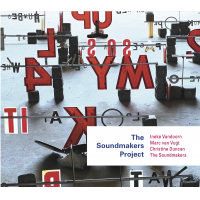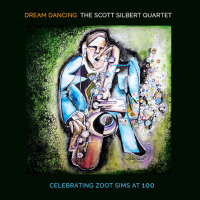The Art and Science of Jazz
Why Is Music Like a Traffic Accident?

by Alan Bryson
Why Is Music Like a Traffic Accident? It is the kind of question that begs a punchline: “Because sometimes there is a lot of horn and not much direction." And while that might get a laugh from the rhythm section, the comparison can go deeper: Both can stretch your sense of time. And when that happens, you are left with remarkably vivid memories. With traffic accidents, we understand the science. The amygdala takes over: a rush ...
Continue ReadingWhere in the Brain Does Creativity Come from? Evidence from Jazz Musicians

by AAJ Staff
According to a popular view, creativity is a product of the brain's right hemisphere--innovative people are considered “right-brain thinkers" while “left-brain thinkers" are thought to be analytical and logical. Neuroscientists who are skeptical of this idea have argued that there is not enough evidence to support this idea and an ability as complex as human creativity must draw on vast swaths of both hemispheres. A new brain-imaging study out of Drexel University's Creativity Research Lab sheds light on this controversy ...
Continue ReadingThelonious Monk Inside Out: A Fresh Perspective On His Music

by Victor L. Schermer
Over the years, Thelonious Monk has resided in our collective minds and hearts like the extra-terrestrial “E.T." or Holden Caulfield from Catcher in the Rye, or some such alien figure whom we don't fully understand yet love and enjoy. His music shocks and disturbs us, yet we take great pleasure in it like a jolting ride at an amusement park. Monk's eccentric way of playing disrupts our equilibrium, yet it attracts us by its charm and wit. Musicians immerse themselves ...
Continue ReadingAccess for People with Disabilities at Jazz Venues: What is really missing

by Hrayr Attarian
A few months ago I asked an acquaintance who is also a jazz fan if he was going to attend a much anticipated concert at a local club. He told me that, alas, he was not because his life partner, who uses a wheelchair, could not navigate the venue. I was surprised as I thought the lack of stairs to the performance area would have been sufficient enough accommodation. He informed me that there also needs to be several other ...
Continue ReadingThe Healing Power of Music: Can Jazz Repair a Damaged Brain? The case of trumpeter Louis Smith

by Hrayr Attarian
The title above is not an abstract statement or a philosophical question. Hence, what follows is not a speculative or metaphysical piece. It is an evaluation of the concrete, experimental data on the merits of music therapy in the treatment of brain injury, particularly one due to a stroke. A stroke or a cerebrovascular accident (CVA) is a sudden event, much like a heart attack, due to either an obstruction in the blood flow or hemorrhage in a specific region ...
Continue ReadingMedical History Blues: The Curious Case of Jake.

by Hrayr Attarian
Historians and scholars of medical humanities mine the (mostly) Western literary classics for the first descriptions of illnesses we have now categorized and studied. But why not explore popular culture as a historical source as well? Can art forms like the blues--the progenitor of jazz and other modern musical forms--contain also clues to medical mysteries of yesterday?One such example takes us back to the years of prohibition and to the “clever" entrepreneurs who tried to bend its laws.
Continue ReadingOn Blind Tom, Essence of Creativity, Autism and Jazz

by Hrayr Attarian
It is safe to assume, that today, Blind Tom Wiggins (AKA Bethune) is not a household name. In the mid to late 19th century, and into the first decade of the 20th, however, Blind Tom was a phenomenon who some named the Eighth Wonder. Although no contemporary physician made the actual diagnosis of autism, it is quite clear from reading about him that he, in all likelihood, fell within the autistic spectrum. Jazz per se did not exist then either, ...
Continue ReadingAll Jazzed Up: Looking for a Jazz Center Within the Folds of the Brain

by Hrayr Attarian
Music is a universal phenomenon across all human cultures both past and present. In that respect it is much like language, and as the understanding of language comes naturally to humans, so, too, does appreciation of music. Language has been mapped to distinct areas of the brain for well over a century, and relatively recently there have been successful efforts to the same thing for music. Before talking about these brain areas it is important to understand ...
Continue Reading


















